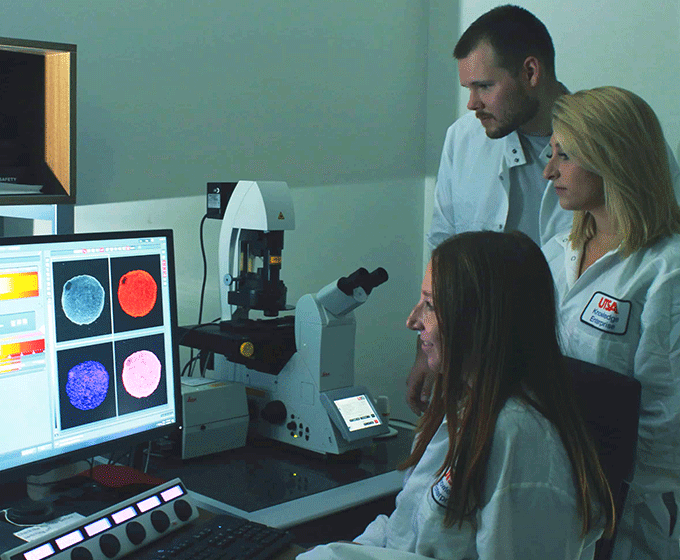
DECEMBER 14, 2022 — The UTSA College of Sciences will introduce a new Ph.D. program in developmental and regenerative sciences (DRS) in fall 2023 to prepare graduates for careers in basic research in academia, clinical research in regenerative medicine, or applied research in the biotechnology industry.
The program will provide new insights into fundamental mechanisms of embryonic and fetal development, how different cell types form and function and how diseases develop when the biological mechanisms required to perform these normal bodily functions are disrupted. Enhanced knowledge of these mechanisms will allow researchers to facilitate more sensitive, accurate and early diagnoses of diseases that could lead to new treatments.
“The Ph.D. in Developmental and Regenerative Sciences offers novel, cutting-edge approaches to preventing, treating and reversing diseases,” said Jenny Hsieh, professor and chair of the UTSA Department of Neuroscience, Developmental and Regenerative Biology (NDRB) and Semmes Distinguished Endowed Chair. “Research from this discipline will facilitate breakthroughs that will help prevent the onset of disease or defective states that may range from neurodegenerative diseases to infertility to diabetes and more.”
The DRS program will offer doctoral students a research-intensive, interdisciplinary educational experience in rapidly developing disciplines and provide training to utilize cutting-edge instrumentation and cell and molecular approaches to pursue urgent challenges in the biomedical sciences. Program faculty have a wide span of research interests and will provide instruction and research-based training and mentoring in several areas, including stem cells, organoids, tissue-engineering, gene therapy, genomics and epigenomics, cell replacement therapies, transplantation biology and therapy and more.
“The UTSA Developmental and Regenerative Sciences Ph.D. program comprises over 30 different labs in academic, clinical, military and biotechnology settings,” said John McCarrey, endowed chair and graduate advisor of record for the program. “Our labs are well equipped and encompass a wide range of research cores with state-of-the-art instrumentation.”
DRS students will have the opportunity to conduct research at several centers of excellence, including the UTSA Institute of Regenerative Medicine, the UTSA Brain Health Consortium, the Center for Innovative Drug Discovery and the South Texas Center for Emerging Infectious Diseases. The program will also collaborate with external institutions including Southwest Research Institute, Texas Biomedical Research Institute, BioBridge Global, UT Health San Antonio, the U.S. Army Institute of Surgical Research and the U.S. Air Force 59th Medical Wing.
“Students receive extensive individual training in their dissertation lab, access to instrumentation and resources in multiple research cores at UTSA, and access to expertise within multiple research centers and institutes both at UTSA and in the broader San Antonio biomedical research community,” McCarrey added.
Widely regarded as a military city, San Antonio has become a central hub and national leader for bioscience and military medicine. The city has 187,000 people employed in bioscience and health care, which is one of the city’s fastest growing industries with 50,000 new jobs created from 2009 to 2019.
To enroll for fall 2023, program applicants must apply before the January 6 deadline, meet the graduate admission requirements listed in the UTSA Graduate Catalog and hold a bachelor’s or master’s degree in biology or a related discipline from an accredited institution. Accepted applicants must attend full-time and will be fully and competitively funded throughout the program via an annual stipend of at least $31,000, plus tuition and health insurance.
Visit the official DRS program website to learn more about its faculty, areas of research and how to apply.
UTSA Today is produced by University Communications and Marketing, the official news source of The University of Texas at San Antonio. Send your feedback to news@utsa.edu. Keep up-to-date on UTSA news by visiting UTSA Today. Connect with UTSA online at Facebook, Twitter, Youtube and Instagram.
Move In To COLFA is strongly recommended for new students in COLFA. It gives you the chance to learn about the Student Success Center, campus resources and meet new friends!
Academic Classroom: Lecture Hall (MH 2.01.10,) McKinney Humanities BldgWe invite you to join us for Birds Up! Downtown, an exciting welcome back event designed to connect students with the different departments at the Downtown Campus. Students will have the opportunity to learn about some of the departments on campus, gain access to different resources, and collect some giveaways!
Bill Miller PlazaJoin us for an intimate evening of cocktails, conversation, and culinary inspiration with Pati Jinich, Emmy-nominated chef and James Beard Award-winning author. Enjoy light bites and signature drinks in the warm, modern setting of Mezquite as Pati connects with guests over her passion for Mexican cuisine and storytelling.
Mezquite Restaurant in Pullman Market, 221 Newell Ave., San Antonio 78215From inspired courses to thoughtful pairings and a rich sense of community, the Ven a Comer Signature Dinner is a night of shared meals, shared stories, and unforgettable flavor.
Stable Hall (Pear Brewery), 307 Pearl Pkwy, San Antonio 78215Come and celebrate this year's homecoming at the Downtown Campus with food, games, giveaways, music, and more. We look forward to seeing your Roadrunner Spirit!
Bill Miller PlazaThe University of Texas at San Antonio is dedicated to the advancement of knowledge through research and discovery, teaching and learning, community engagement and public service. As an institution of access and excellence, UTSA embraces multicultural traditions and serves as a center for intellectual and creative resources as well as a catalyst for socioeconomic development and the commercialization of intellectual property - for Texas, the nation and the world.
To be a premier public research university, providing access to educational excellence and preparing citizen leaders for the global environment.
We encourage an environment of dialogue and discovery, where integrity, excellence, respect, collaboration and innovation are fostered.